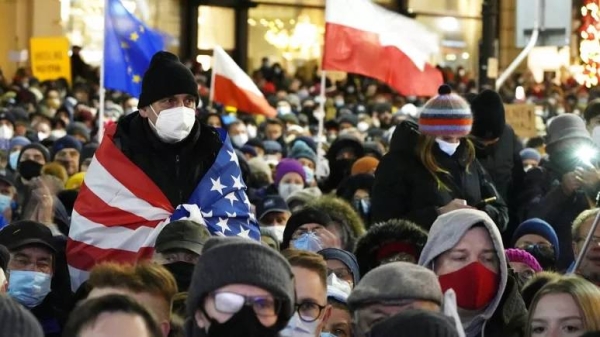
Poland’s ruling populists have been given free rein in their mission to reshape the country after liberal hopes of taking the presidency were crushed in a narrow defeat following a divisive campaign.
The incumbent president, Andrzej Duda, was elected for another five-year term as a familiar set of demographic divisions played out in the vote. Poles under 50 and those living in larger towns and cities backed the liberal challenger, Rafał Trzaskowski, while older and rural voters stood by Duda.
With almost all the ballots counted on Monday, Duda, who was backed by the ruling Law and Justice party (PiS) and ran a campaign laced with homophobic rhetoric, was on 51.2% of the vote and Trzaskowski on 48.8%. The challenger conceded on Monday afternoon.
“Thank you also for the amazing energy that we have managed to unleash together during these few weeks,” Trzaskowski, the mayor of Warsaw, wrote on Twitter. In a short speech later, he congratulated Duda and expressed hope that his second term might be different from the first.
Duda’s supporters celebrated what they saw as a clear mandate for PiS to continue on a path that has reduced poverty but raised concerns that democracy is under threat. Critics and human rights groups expressed fears that Duda’s victory would boost illiberal tendencies not only at home but also within the EU.
During its time in office, PiS has clashed with Brussels over rule of law and assaults on the judiciary, and on Tuesday the European parliament’s civil liberties committee will vote on whether the EU should broaden its continued disciplinary procedure against Poland. The EU executive launched an investigation into the rule of law in Poland more than four and a half years ago, but the process has languished as EU member states are divided over how to respond.
Hungary’s prime minister, Viktor Orbán, who has also clashed with Brussels, marked Duda’s re-election by posting on Facebook a picture of himself shaking hands with the Polish president, with graphics of a hand showing a “V” for victory and a Polish flag.
Trzaskowski ran an energetic campaign, narrowing the gap in a race that Duda had been expected to win easily before the original May vote was postponed due to the coronavirus pandemic. In recent days there had been a real sense that the election could go either way, and the result left Trzaskowski’s supporters deflated.
If he had won, Trzaskowski would have been able to use the presidential veto to stymie much of the PiS legislative agenda. Now, with the next parliamentary elections not until 2023 and PiS controlling most of the levers of power, the fear is that PiS will double down on its strategy for at least the next three years.
A mission of election observers from the Organisation for Security and Cooperation in Europe said on Monday that the voting had been well organised and security measures relating to the pandemic had been properly enforced, but they expressed concern about a lack of impartiality on public television and about the combative nature of the campaign, and in particular Duda’s rhetoric.
“We were worried by instances of intolerant rhetoric of a homophobic, xenophobic and antisemitic nature, particularly among the president’s campaign and the public television,” said Thomas Boserup, the head of the monitoring mission. He criticised Duda personally for use of homophobic rhetoric.
During the campaign, the stable of media loyal to the government attacked Trzaskowski as an “extremist” and on various occasions alleged he was backed by shadowy foreign forces, or that he would take money from Poles and disburse it to “Jewish interests”. The outlets also criticised him for his support of LGBT rights during his time as mayor. Trzaskowski said in the run-up to the vote that it was “now or never” to stop PiS, which has governed Poland since 2015.
While some commentators expressed optimism that so many young Poles had voted for change, others warned that PiS may step up its xenophobic rhetoric. “PiS sees the nationalist far right as a bigger threat to its majority than liberals, and will want to send signals to these young nationalist voters,” said Wojciech Przybylski, a political analyst.
Bart Staszewski, an LGBT activist who during the campaign confronted Duda with photographs of LGBT teenagers who had taken their own lives, wrote on Twitter that there was “no hope of improving the situation of minorities” in the country after the result.
The race was closely watched by politicians around the globe for clues about what may or may not work in the fight against populists. In an unusual intervention, Donald Trump received Duda at the White House days before the vote and praised him as doing a “terrific job”.
Trzaskowski carried the hopes of liberals worldwide, fielding a call from Barack Obama in the days before the vote. “Encouraging that so many, young people in particular, were mobilised for an open inclusive Poland at the heart of the European Union,” Sophie in ‘t Veld, a Dutch liberal MEP, wrote on Twitter on Monday. She said it was “shameful” for a politician to have won an election in Europe in 2020 with “a homophobic hate campaign”.












